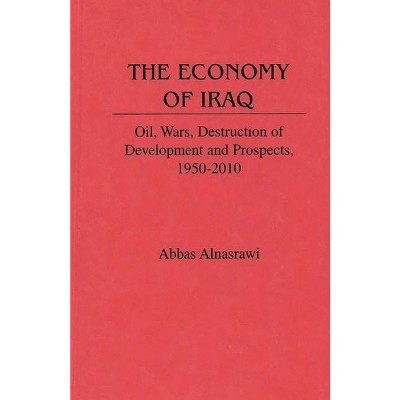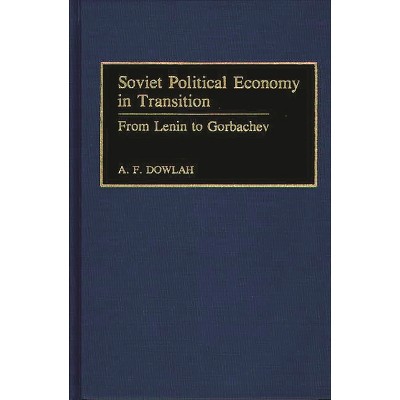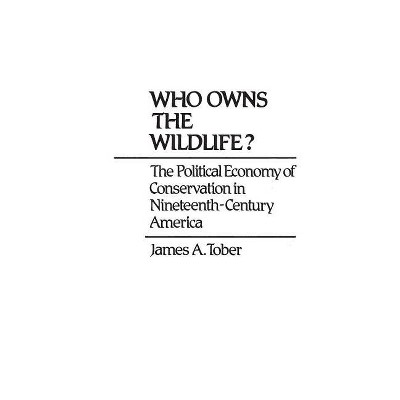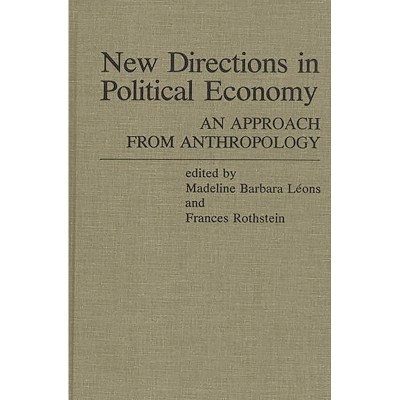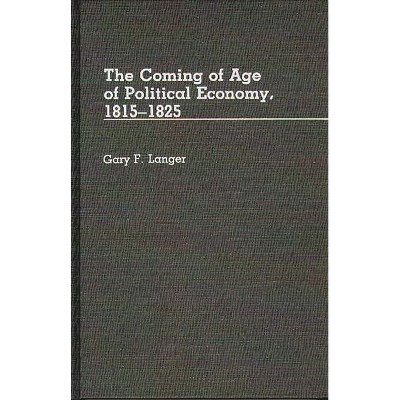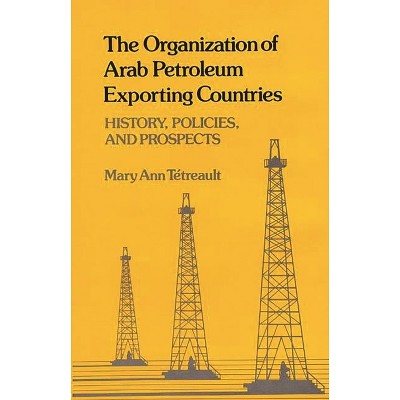Arab Nationalism, Oil, and the Political Economy of Dependency - (Contributions in Economics and Economic History) by Abbas Alnasrawi (Hardcover)

About this item
Highlights
- This pathbreaking survey analyzes a complex subject and is especially timely at this critical juncture of international affairs.
- About the Author: ABBAS ALNASRAWI is Professor of Economics at the University of Vermont.e His previous publications include Financing Economic Development in Iraq: The Role of Oil in the Middle Eastern Economy, Arab Oil and United States Energy Requirements (1982), the EC in a Changing World Economy, and, as co-editor, Consistency of U.S. Foreign Policy: The Gulf War and the Iran-Contra Affair's Foreign Policy (1989).
- 232 Pages
- Business + Money Management, International
- Series Name: Contributions in Economics and Economic History
Description
About the Book
This pathbreaking survey analyzes a complex subject and is especially timely at this critical juncture of international affairs. Abbas Alnasrawi covers the field from the emergence of modern Arab economic dependence to the present mid-eastern impasse. Alnasrawi contends that Arab economic development was shaped by Arab nationalist thought, the emergence of the oil industry in the Arab region, and the integration of Arab economies into the international economic system. The volume takes a clear-sighted look at the evolution of each of the three forces and details their impact on the development of the Arab economies, along with their present status. The contradictions between the needs of the single state and the needs of Arab economic integration, Arab unity, and pan-Arab economic planning receive special attention. Alnasrawi develops the concept of derivative dependency, illustrating the extent to which the economies of the non-oil states are being affected by what happens to the economies of the oil-producing states. The final chapter presents a detailed picture of the forces that led to the Iraqi invasion of Kuwait and integrates the events of August 1990 with the main themes of the book.
Arab economic development is addressed in ten chapters that cover the period from the first phase of Arab dependency during the Ottoman period, 1500-1800, until the present time. Discussions of Arab dependency in the context of world capitalism, the emergence of modern Arab nationalism, and current Arab economic thought and writings are the focus of the first two chapters. Arab nationalism and Arab economic unity, multinational oil and the deepening of Arab dependency, and the Arab oil weapon are considered in the next three chapters. Chapter six examines the role of Saudi Arabia and the United States in the fall of OPEC. In The 1980s, The Gulf War, and the Myth of Arab Oil Power, Alnasrawi explores the role of stockpiles, price revolution to price collapse, and the determinants of Saudi oil policy. Chapter eight takes a look at the dimensions of Arab economic dependency and closes with some observations on the political economy of Arab dependency. The book concludes with a chapter on the current problems of the Arab economies and their future prospects. Finally, the epilogue sheds new light on the present situation in Kuwait and shows how the Iraqi invasion supports the main themes of the volume. This in-depth review of Arab economic development puts this subject into a manageable context for students of Third World development, international relations, multinational oil policy, and foreign policy. It will also be an invaluable resource for courses dealing with the economics of oil, Middle East economic development, international economic problems, and international political economy.
Book Synopsis
This pathbreaking survey analyzes a complex subject and is especially timely at this critical juncture of international affairs. Abbas Alnasrawi covers the field from the emergence of modern Arab economic dependence to the present mid-eastern impasse. Alnasrawi contends that Arab economic development was shaped by Arab nationalist thought, the emergence of the oil industry in the Arab region, and the integration of Arab economies into the international economic system. The volume takes a clear-sighted look at the evolution of each of the three forces and details their impact on the development of the Arab economies, along with their present status. The contradictions between the needs of the single state and the needs of Arab economic integration, Arab unity, and pan-Arab economic planning receive special attention. Alnasrawi develops the concept of derivative dependency, illustrating the extent to which the economies of the non-oil states are being affected by what happens to the economies of the oil-producing states. The final chapter presents a detailed picture of the forces that led to the Iraqi invasion of Kuwait and integrates the events of August 1990 with the main themes of the book.
Arab economic development is addressed in ten chapters that cover the period from the first phase of Arab dependency during the Ottoman period, 1500-1800, until the present time. Discussions of Arab dependency in the context of world capitalism, the emergence of modern Arab nationalism, and current Arab economic thought and writings are the focus of the first two chapters. Arab nationalism and Arab economic unity, multinational oil and the deepening of Arab dependency, and the Arab oil weapon are considered in the next three chapters. Chapter six examines the role of Saudi Arabia and the United States in the fall of OPEC. In The 1980s, The Gulf War, and the Myth of Arab Oil Power, Alnasrawi explores the role of stockpiles, price revolution to price collapse, and the determinants of Saudi oil policy. Chapter eight takes a look at the dimensions of Arab economic dependency and closes with some observations on the political economy of Arab dependency. The book concludes with a chapter on the current problems of the Arab economies and their future prospects. Finally, the epilogue sheds new light on the present situation in Kuwait and shows how the Iraqi invasion supports the main themes of the volume. This in-depth review of Arab economic development puts this subject into a manageable context for students of Third World development, international relations, multinational oil policy, and foreign policy. It will also be an invaluable resource for courses dealing with the economics of oil, Middle East economic development, international economic problems, and international political economy.Review Quotes
"This very interesting book focuses the Arab states economic dependence on the industrialized world and the resulting nationalistic reactions. The first two chapters discuss the historical evolution of this dependence from the 16th century to the present. Arab nationalism was first internationally recognized in 1913 but remained ineffective as Arab elite groups had developed interests that largely coincided with those of the industrialized countries. The establishment of Israel ignited Arab nationalism, but even the creation of OPEC in 1960 did not advance it. Only the 1973 Arab-Israeli war and the use of "the Arab oil weapon" made Arab nationalism really active. However, the author states that this oil weapon had a "built-in failure;" the oil embargo against the US and other countries drove up prices and caused an economic depression that made the industrialized countries stand up against this threat. The result was cooperation between the oil-producing Arab countries and the industrialized world to stabilize oil prices and avoid such future calamities and political separation of the oil-producing Arab countries from the others. For these reasons the economic dependency of the Arab countries on the industrialized world can be expected to continue. For university and research collections."-Choice
?This very interesting book focuses the Arab states economic dependence on the industrialized world and the resulting nationalistic reactions. The first two chapters discuss the historical evolution of this dependence from the 16th century to the present. Arab nationalism was first internationally recognized in 1913 but remained ineffective as Arab elite groups had developed interests that largely coincided with those of the industrialized countries. The establishment of Israel ignited Arab nationalism, but even the creation of OPEC in 1960 did not advance it. Only the 1973 Arab-Israeli war and the use of "the Arab oil weapon" made Arab nationalism really active. However, the author states that this oil weapon had a "built-in failure;" the oil embargo against the US and other countries drove up prices and caused an economic depression that made the industrialized countries stand up against this threat. The result was cooperation between the oil-producing Arab countries and the industrialized world to stabilize oil prices and avoid such future calamities and political separation of the oil-producing Arab countries from the others. For these reasons the economic dependency of the Arab countries on the industrialized world can be expected to continue. For university and research collections.?-Choice
About the Author
ABBAS ALNASRAWI is Professor of Economics at the University of Vermont.e His previous publications include Financing Economic Development in Iraq: The Role of Oil in the Middle Eastern Economy, Arab Oil and United States Energy Requirements (1982), the EC in a Changing World Economy, and, as co-editor, Consistency of U.S. Foreign Policy: The Gulf War and the Iran-Contra Affair's Foreign Policy (1989). Since 1971 he has published numerous articles, monographs, and chapters on Arab and mid-Eastern economies.Shipping details
Return details
Trending Non-Fiction






